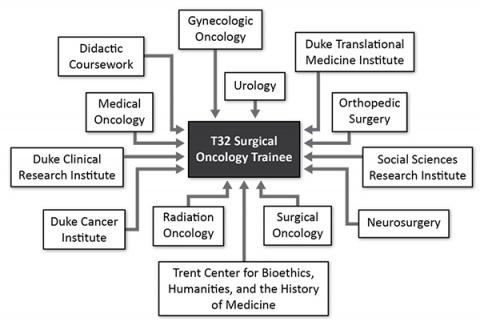
Figure: Duke Partnerships in Support of T32 Trainees
The National Cancer Institute (NCI) has awarded the Duke Department of Surgery a five-year training grant to support translational research in surgical oncology. The grant is led by four principal investigators, including Kim Lyerly, MD, Division of Surgical Sciences, Shelley Hwang, MD, Division of Advanced Oncologic and Gastrointestinal Surgery, David Harpole, MD, Division of Cardiovascular and Thoracic Surgery, and John Stewart, MD, Division of Advanced Oncologic and Gastrointestinal Surgery.
The Duke Research Training Program in Surgical Oncology will develop surgeons and perioperative physicians into physician-scientists, which is critical to the multidisciplinary approach needed to investigate novel approaches to cancer. The program will be led by a leadership team of academic surgeon-scientists with expertise in surgical oncology, pathology, immunology, and health outcomes research. Supplemented by mentors with expertise in basic, translational, and clinical research, this multidisciplinary team spans the breadth of surgical oncology research to address research questions in three distinct tracks:
Cancer Biomarkers and Biology of Local Disease
Mentors
- David H. Harpole, MD (Track Leader)
- Benjamin A. Alman, MD
- Darell Doty Bigner, MD, PhD
- Wei Chen, PhD
- Christopher Counter, PhD
- Gayathri Devi, PhD
- David Kirsch, MD, PhD
- Corinne Linardic, MD, PhD
- Donald McDonnell, PhD
- Susan Murphy, PhD
- Ann Marie Pendergast, PhD
- Nirmala Ramanujam, PhD
- Hai Yan, MD, PhD
Cancer Immunotherapy
Mentors
- H. Kim Lyerly, MD (Track Leader)
- Gerard Blobe, MD, PhD
- Marc Caron, PhD
- Nelson Chao, MD
- Matthias Gromeier, MD
- Zachary Hartman, PhD
- Michael Morse, MD
- Smita Nair, PhD
- John Sampson, MD, PhD
- Xiao-Fan Wang, PhD
- Yiping Yang, MD, PhD
Clinical Investigation and Health Services Research
Mentors
- Shelley Hwang, MD, MPH (Track Co-Leader)
- John Stewart, MD, MBA (Track Co-Leader)
- Andrew Berchuck, MD
- Kimberly Lynn Blackwell, MD
- Peter E. Fecci, MD, PhD
- Brant Inman, MD
- Susan Halabi, PhD
- Marilyn Hockenberry, PhD, RN
- Terry Hyslop, PhD
- Evan Myers, MD, MPH
- Laura Porter, PhD
- Julie Ann Sosa, MD
- David Witsell, MD
The program will support three research fellows in its first year of funding and six research fellows each following year. Program participants will consist of surgical residents recruited from within as well as outside of Duke. Trainees will select a primary mentor from a highly experienced and diverse group of 37 researchers. Guided by their mentors, the trainees will each develop and execute a research project, which will be the basis of a future career development or independent research award application. Trainees will become skilled in research methods and will be prepared to pursue independent academic careers that will improve the health of patients with cancer or premalignant conditions.
The first three trainees will be supported on this grant beginning July 1, 2017.